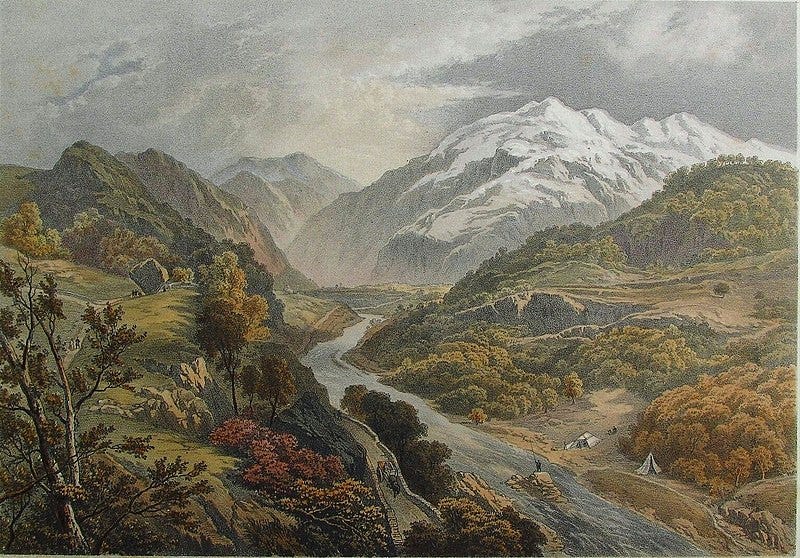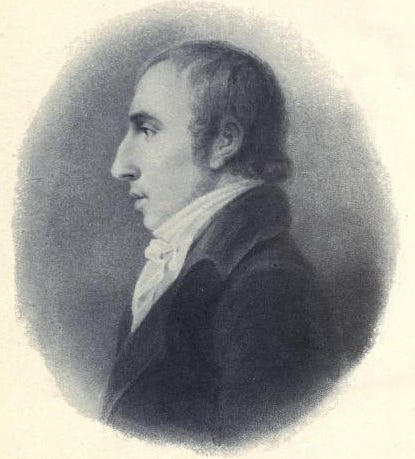Today’s Poem: Spots of Time
Another look at Wordsworth, The Prelude, and the power of memory

The Prelude (1850), Book Twelfth, Lines 208–218
by William Wordsworth
There are in our existence spots of time, That with distinct pre-eminence retain A renovating virtue, whence — depressed By false opinion and contentious thought, Or aught of heavier or more deadly weight, In trivial occupations, and the round Of ordinary intercourse, our minds Are nourished and invisibly repaired; A virtue, by which pleasure is enhanced, That penetrates, enables us to mount When high, more high, and lifts us up when fallen. This efficacious spirit chiefly lurks Among those passages of life that give Profoundest knowledge to what point, and how The mind is lord and master — outward sense The obedient servant of her will. Such moments Are scattered everywhere, taking their date From our first childhood . . . ═══════════════════════
(Just over a year ago, in the first weeks of Poems Ancient and Modern, we presented to our small initial audience several poems that seem worth reviving for the larger number of readers the newsletter has now. And so, over the past few weeks, we have revisited a few of those poems from our archive — including today’s consideration of Wordsworth’s “spots of time,” which has become a recurring conversation here.)
From the end of the 1790s to the end of his life, William Wordsworth (1770–1850) labored at his enormous, climactic, blank-verse opus, The Prelude. As early as 1798, in the Quantock Hills of Somerset, with his sister Dorothy to share his house (and his notebooks), and with Samuel Taylor Coleridge (1772–1834) for a neighbor and (sometimes) kindred spirit, Wordsworth had begun to set down the first fragmented passages, sketching recollections of the River Derwent and the beloved landscapes of his boyhood.
These early, ruminative lines contain scenes that would appear for the last time in the 1850 edition of the poem, published three months after its author’s death and given its final, familiar title by his widow. But in their first fragmentary form, beautiful as these passages are, they are verses in search of something to be about.
By 1805, the year the first edition of the poem appeared in print, Wordsworth had written himself to the point of an epiphany. He had also, in the course of that epiphany, coined a phrase that would bring the entirety of his massive project into focus. Book Eleventh of the thirteen-section 1805 Prelude would contain a passage beginning, “There are in our existence spots of time . . . ” If The Prelude, as it grew, constituted an act of reclamation, retrieving and reconstructing in verse an extended, long-buried vision of the poet’s own early life, then the passage and the phrase, “spots of time,” would signal what, in that imaginative act of reclamation, was actually at stake.
The passage from the 1805 edition reads, in its entirety:
There are in our existence spots of time,
Which with distinct pre-eminence retain
A renovating virtue, whence, depressed
By false opinions and contentious thought,
Or aught of heavier or more deadly weight
In trivial occupations and the round
Of ordinary intercourse, our minds
Are nourished and invisibly repaired —
A virtue, by which pleasure is enhanced,
That penetrates, enables us to mount
When high, more high, and lifts us up when fallen.
This efficacious spirit chiefly lurks
Among those passages of life in which
We have the deepest feeling that the mind
Is lord and master, and that outward sense
Is but the obedient servant of her will.
Such moments, worthy of all gratitude,
Are scattered everywhere, taking their date
From our first childhood — in our childhood even
Perhaps are more conspicuous. Life with me,
As far as memory can look back, is full
Of this beneficent influence.
Taken on its own, the passage seems to imply something fairly straightforward: that to call up certain memories of “Life . . . full / of this beneficent influence” is to harness the mind’s own self-restorative power. Wordsworth, after all, did espouse a high doctrine of the mind as the arbiter and orderer of reality. But what follows immediately after the line break at “influence” banishes any notion that these “spots of time,” with their “renovating virtue,” are simply and straightforwardly pleasant memories, a warm, soothing spa bath in which the mind might soak itself at need.

The “spot of time” into which the poem directly plunges is a memory of riding, as a small child, through a moor “bottom” where “in former times” a murderer had been hung to die in an iron gibbet. Separated from the old servant riding with him as guide and protector, the child comes upon the very spot, with the murderer’s name carved into the earth where the scaffold had stood, a stark and horrifying remembrance. Fleeing in terror, he next discovers a “naked pool” shining like a comfortless “beacon” in the shadow of the hills. A girl carrying a jug on her head struggles along in a tearing wind that “vexes” her clothes. The whole scene is one of disturbance, all the elemental powers of death, danger, and chaos unveiling themselves for the little boy to see.
This scene, in turn, is followed by a later memory of the same place, a time spent wandering the moors with “those two dear ones,” his sister Dorothy and his future wife, Mary Hutchinson. In the 1850 edition, Dorothy has been excised, so that “the blessed time of early love” carries a more particular, adult shade of meaning, but from that earliest version, the previous, terrifying memory is gilded by this later association. It’s not that the “spirit of pleasure and youth’s golden gleam” dispels the earlier, more horrifying memory, but that the poet’s imagination makes of the two an integrated whole. “So feeling comes in aid / Of feeling, and diversity of strength /Attends us, if but once we have been strong.”
This web of associations with that place assumes a chiaroscuro aspect, the darkness of the earlier memory making the later one all the more brilliant. Adam Nicolson writes, in The Making of Poetry: Coleridge, the Wordsworths, and Their Year of Marvels, of Wordsworth in 1798: Composing “Lines Written a Few Miles Above Tintern Abbey,” he discovers “a new understanding of what truth and beauty might be: beauty . . . as a cosmic, universal and profoundly mysterious sense of love and oneness, in which everything is deeply interfused with everything else, where the boundaries are not clear and where substance is uncertain.” That fluid-boundaried continuity, holding together in itself all manner of contrasts and contradictions, lies at the heart of Wordsworth’s notion of beauty, with memory for its vehicle, as a reparative force in the vast cosmos of the human mind.
The 1850 edition of The Prelude — increased now to fourteen “Books” — integrates the “spots of time” passage more seamlessly into the series of recollections that illustrate its meaning. Gone are the lines reiterating the idea of childhood as a time of “conspicuous” moments to be recalled. Gone is the throat-clearing “Life with me” preamble to the memory that will make these ideas plain. The whole poem has been expanded and revised, its focus tirelessly sharpened, to clarify the ultimate point of these “spots of time.” Wordsworth’s chief epiphany has been his apprehension of the mind’s own capacity, by calling up remembered beauties in all their complicated aspect, to remake, restore, and renovate itself. This moment is the synthesis toward which the whole poem has been sweeping, but it assumes further significance as an assertion of the poet’s vocation.
The Prelude, in both the 1805 and 1850 editions, begins with a consideration of all the stories a poet might tell. The 1805 edition describes the poet’s desire “to make them inmates in the hearts of men.” The 1850 edition emends “inmates” to “dwellers” — as though those words and images had been let out of prison, to live voluntarily in the imagination. But what words and images? “[S]ome old / romantic tale by Milton left unsung?” Stories of Mithradates? Odin? William Wallace? Immediately, as if in answer, intruding on his consciousness, there wells up “[t]hat one, the fairest of all rivers,” whose “murmurs” blend with and blur the words of his nurse’s song. The river supersedes all those other possible subjects.
What overtakes the poet’s desire to tell a story is the compulsion to tell his own story, to make it a free and living “dweller in the hearts of men.” This gift that Wordsworth bequeaths to the poetic tradition is not simply his vision of the poet as rememberer, the wielder of this renovating power. The idea of the “spot of time” itself, as a literary trope or subgenre, has continued to inform poems as varied as Edward Thomas’s World War I poem, “Adlestrop,” and T.S. Eliot’s “Preludes.” Wordsworth’s own Prelude concludes with this expansive vision of a human and poetic tradition: “[W]hat we have loved, / Others will love, and we will teach them how; / Instruct them how the mind of man becomes / A thousand times more beautiful than the earth.”





Matt Garland and Adam Roberts point below — absolutely rightly — to the near-physicality of these spots of times, as though they were actual locations we could visit in memory for their "renovating virtue."
I was going to launch here into the modern philosophical innovation achieved by Descartes, who really does treat the mind as though it were a landscape we could walk through and observe. (This is how his proof for the existence of God from the idea of infinity works: As we stroll through the mind we find an object that we are incapable of having created ourselves; also how the cogito works, in a complicated performative way, "each and every time we think it.")
But that's a little far afield, maybe, for talking about poetry, so I'll just mention that "Spots of Time poetry" is a topic Sally Thomas and I have been discussing, in our far-too-rare get-togethers, for a few years now. It's shown up, for example, in our discussions of Edward Thomas's "Adelstrop" [https://poemsancientandmodern.substack.com/p/todays-poem-adlestrop] and Robert Hillyer's "Early in the Morning." [https://poemsancientandmodern.substack.com/p/todays-poem-early-in-the-morning]
The power of their "renovating virtue" might be usefully be understood through the via negativa: John Henry Newman once mentioned what he called the "stained imagination," injured by some witnessed vulgarity — say, a teenager’s first encounter with violent pornography. Whatever the damage of such a memory, a Spot of Time is the reverse: a sight of reality that endures in recollection as a redemptive place we can visit to repair the mind.
This line always stuck with me: There r in r existence spots of time. Why is that double r so powerful? And why do I pause after existence and before spot, which makes spots land harder? I think that line has been a spot of time for me.